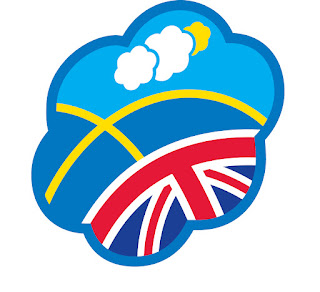Last Saturday we were invited to see a slide show, presented by a local Scout called Callum, who had been selected to attend the World Scout Jamboree in Sweden which was held in late July and early August 2011. To enable him to be able to attend, he had to raise money for the trip and, for Callum, that involved things such as arranging Quiz Nights and selling at Car Boot Sales . . . Sweet Moments helped with a couple of raffle prizes along the way.
Along with the slide show, Callum had a collection of scout shirts that he had obtained by swapping with other Scouts at the Jamboree, lots of literature on Scouting in general and a collection of badges and scarves (also swaps). He also had the enormous bag/rucksack thing that had to fit all his clothing, tent and (many) other items that you need at a Jamboree. Scouts do not travel light!
It was a privilege to be invited along and to see the results of the fund raising events that enabled him to attend the Jamboree. Thank you Callum!
Along with the slide show, Callum had a collection of scout shirts that he had obtained by swapping with other Scouts at the Jamboree, lots of literature on Scouting in general and a collection of badges and scarves (also swaps). He also had the enormous bag/rucksack thing that had to fit all his clothing, tent and (many) other items that you need at a Jamboree. Scouts do not travel light!
It was a privilege to be invited along and to see the results of the fund raising events that enabled him to attend the Jamboree. Thank you Callum!
 | |
| British Emblem for World Scout Jamboree in Sweden 2011 |






 The confectionery business of Gerardus Johannes Droste was opened in Haarlem in the summer of 1863. Customers could buy a cup of waterchocolate and various types of candy, for example chocolate pastilles, officially called 'Pastilles Droste'. The first Droste factory of the firm G.J. Droste opened its doors on August 2nd 1890.
The confectionery business of Gerardus Johannes Droste was opened in Haarlem in the summer of 1863. Customers could buy a cup of waterchocolate and various types of candy, for example chocolate pastilles, officially called 'Pastilles Droste'. The first Droste factory of the firm G.J. Droste opened its doors on August 2nd 1890.  After the Second World War Droste recovered from the damage sustained during the war. In the first years Droste did not want to export its products, due to a lack of raw materials and pre-war quality could not be achieved. This phase gradually changed. It was the availability of foreign currency that lead to an increase in exports. Five years after the war Droste was able, once again, to supply quality products to the home and abroad market.
After the Second World War Droste recovered from the damage sustained during the war. In the first years Droste did not want to export its products, due to a lack of raw materials and pre-war quality could not be achieved. This phase gradually changed. It was the availability of foreign currency that lead to an increase in exports. Five years after the war Droste was able, once again, to supply quality products to the home and abroad market.